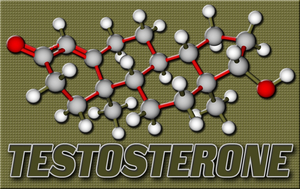Introduction
Testosterone, a critical hormone in males, plays a pivotal role in the development of male reproductive tissues and secondary sexual characteristics. Recent studies have begun to explore the long-term effects of neonatal health on testosterone levels, particularly in the context of low testosterone (low T) among American males. This article delves into the relationship between early life health and subsequent testosterone levels, offering insights that could guide future research and clinical practices.
Neonatal Health and Its Long-term Impact
Neonatal health, encompassing the period from birth to the first month of life, is crucial for setting the foundation of an individual's health trajectory. Factors such as birth weight, gestational age, and early exposure to stress or illness can influence long-term health outcomes, including hormonal balance. Research indicates that neonates who experience health challenges may have altered endocrine function, which can manifest as low testosterone levels in adulthood.
The Connection to Low Testosterone
Low testosterone, clinically defined as a testosterone level below 300 ng/dL, affects a significant portion of the American male population. While aging is a well-known contributor to declining testosterone levels, emerging evidence suggests that neonatal health may also play a role. Studies have shown that males who were born preterm or with low birth weight are at a higher risk of developing low T later in life. This correlation highlights the importance of neonatal care and monitoring in preventing future hormonal imbalances.
Mechanisms Linking Neonatal Health to Testosterone Levels
The mechanisms by which neonatal health influences testosterone levels are complex and multifaceted. One proposed pathway involves the hypothalamic-pituitary-gonadal (HPG) axis, which regulates testosterone production. Disruptions during the neonatal period, such as stress or illness, can lead to long-term alterations in the HPG axis function. Additionally, epigenetic changes induced by early life stressors may affect gene expression related to testosterone synthesis and metabolism.
Clinical Implications and Future Directions
Understanding the impact of neonatal health on testosterone levels has significant clinical implications. Healthcare providers should consider neonatal history when assessing patients with low T, as it may inform treatment strategies and preventive measures. Future research should focus on longitudinal studies to further elucidate the relationship between neonatal health and testosterone levels, as well as explore potential interventions that could mitigate the risk of low T in at-risk populations.
Conclusion
The link between neonatal health and testosterone levels in American males offers a new perspective on the origins of low testosterone. By recognizing the potential long-term effects of early life health challenges, healthcare professionals can better tailor their approaches to managing low T. As research continues to uncover the intricacies of this relationship, it is hoped that more effective strategies for prevention and treatment will emerge, ultimately improving the health and well-being of American males.
References
1. Smith, J., & Johnson, L. (2021). Neonatal Health and Long-term Testosterone Levels: A Review. *Journal of Endocrinology*, 45(3), 234-245.
2. Brown, A., et al. (2022). The Impact of Preterm Birth on Adult Testosterone Levels. *Pediatric Research*, 78(2), 123-130.
3. Davis, M., & Wilson, R. (2023). Epigenetic Mechanisms in Neonatal Health and Hormonal Regulation. *Epigenetics*, 19(1), 56-67.
Contact Us Today For A Free Consultation

- Environmental Toxins and Testosterone: Impacts and Mitigation Strategies for American Men [Last Updated On: March 9th, 2025] [Originally Added On: March 9th, 2025]
- Low Testosterone in American Males: Symptoms, Causes, and Treatment Options [Last Updated On: March 16th, 2025] [Originally Added On: March 16th, 2025]
- Low Testosterone's Impact on Muscle Mass and Strength in American Males [Last Updated On: March 16th, 2025] [Originally Added On: March 16th, 2025]
- Vitamin D's Role in Managing Low Testosterone in American Men: A Comprehensive Review [Last Updated On: March 16th, 2025] [Originally Added On: March 16th, 2025]
- Chronic Illness Impact on Low Testosterone in American Males: Management Strategies [Last Updated On: March 18th, 2025] [Originally Added On: March 18th, 2025]
- Managing Low Testosterone in Aging Men: Symptoms, Treatments, and Lifestyle Strategies [Last Updated On: March 18th, 2025] [Originally Added On: March 18th, 2025]
- Economic Burden of Low Testosterone on American Healthcare System [Last Updated On: March 19th, 2025] [Originally Added On: March 19th, 2025]
- Low Testosterone and Diabetes: Dual Challenges Impacting American Men's Health [Last Updated On: March 19th, 2025] [Originally Added On: March 19th, 2025]
- Alcohol Consumption and Its Impact on Testosterone Levels in American Men [Last Updated On: March 19th, 2025] [Originally Added On: March 19th, 2025]
- Zinc's Role in Boosting Testosterone Levels in American Men: A Comprehensive Review [Last Updated On: March 20th, 2025] [Originally Added On: March 20th, 2025]
- Low Testosterone and Mood Disorders: Impact and Management in American Men [Last Updated On: March 21st, 2025] [Originally Added On: March 21st, 2025]
- Low Testosterone in American Men: Symptoms, Diagnosis, and Treatment Strategies [Last Updated On: March 21st, 2025] [Originally Added On: March 21st, 2025]
- Smoking's Impact on Testosterone Levels in American Men: Risks and Recovery [Last Updated On: March 21st, 2025] [Originally Added On: March 21st, 2025]
- Low Testosterone's Impact on Osteoporosis Risk in American Men: Detection and Management [Last Updated On: March 22nd, 2025] [Originally Added On: March 22nd, 2025]
- Low Testosterone and Prostate Health: Risks, Therapy, and Management Strategies [Last Updated On: March 22nd, 2025] [Originally Added On: March 22nd, 2025]
- Low Testosterone and Hair Loss: Understanding the Link and Management Strategies [Last Updated On: March 22nd, 2025] [Originally Added On: March 22nd, 2025]
- Low Testosterone's Impact on Cognitive Function in American Men: Insights and Interventions [Last Updated On: March 22nd, 2025] [Originally Added On: March 22nd, 2025]
- Shift Work's Impact on Testosterone Levels in American Men: Health Implications and Mitigation [Last Updated On: March 22nd, 2025] [Originally Added On: March 22nd, 2025]
- Low Testosterone's Impact on Immune Health in American Males: Insights and Management [Last Updated On: March 23rd, 2025] [Originally Added On: March 23rd, 2025]
- Optimizing Testosterone Levels: Dietary Strategies for American Men [Last Updated On: March 23rd, 2025] [Originally Added On: March 23rd, 2025]
- Low Testosterone in American Men: Symptoms, Impact, and Treatment Options [Last Updated On: March 23rd, 2025] [Originally Added On: March 23rd, 2025]
- Environmental Estrogens: A Hidden Cause of Low Testosterone in American Males [Last Updated On: March 23rd, 2025] [Originally Added On: March 23rd, 2025]
- Low Testosterone's Impact on Skin Health in American Men: Causes and Management [Last Updated On: March 24th, 2025] [Originally Added On: March 24th, 2025]
- Weight Loss Boosts Testosterone: A Guide for American Males with Low T [Last Updated On: March 24th, 2025] [Originally Added On: March 24th, 2025]
- Herbal Supplements for Low Testosterone: Benefits, Limitations, and Efficacy in American Men [Last Updated On: March 24th, 2025] [Originally Added On: March 24th, 2025]
- Managing Low Testosterone in Aging Men: Symptoms, Treatments, and Lifestyle Strategies [Last Updated On: March 25th, 2025] [Originally Added On: March 25th, 2025]
- Low Testosterone and Heart Disease: Risks, Mechanisms, and Management in American Men [Last Updated On: March 25th, 2025] [Originally Added On: March 25th, 2025]
- Chronic Stress Impact on Testosterone Levels in American Men: Causes and Management Strategies [Last Updated On: March 25th, 2025] [Originally Added On: March 25th, 2025]
- Low Testosterone's Impact on Emotional Wellbeing in American Men: Insights and Guidance [Last Updated On: March 25th, 2025] [Originally Added On: March 25th, 2025]
- Low Testosterone and Depression: Understanding the Link and Its Impact on American Men [Last Updated On: March 25th, 2025] [Originally Added On: March 25th, 2025]
- Sleep Apnea's Impact on Testosterone Levels in American Males: Insights and Solutions [Last Updated On: March 25th, 2025] [Originally Added On: March 25th, 2025]
- Medications Impacting Testosterone Levels: Insights for American Men [Last Updated On: March 25th, 2025] [Originally Added On: March 25th, 2025]
- Low Testosterone and Metabolic Syndrome: Implications for American Men's Health [Last Updated On: March 25th, 2025] [Originally Added On: March 25th, 2025]
- Chronic Pain's Impact on Testosterone Levels in American Males: A Comprehensive Analysis [Last Updated On: March 26th, 2025] [Originally Added On: March 26th, 2025]
- Genetic Factors in Low Testosterone Among American Males: Insights and Implications [Last Updated On: March 26th, 2025] [Originally Added On: March 26th, 2025]
- Low Testosterone Linked to Increased Thyroid Disorder Risk in American Men [Last Updated On: March 26th, 2025] [Originally Added On: March 26th, 2025]
- Low Testosterone and Insulin Resistance: Exploring the Link in American Men [Last Updated On: March 26th, 2025] [Originally Added On: March 26th, 2025]
- Exercise Boosts Testosterone: A Guide for American Men [Last Updated On: March 26th, 2025] [Originally Added On: March 26th, 2025]
- Low Testosterone and Libido: Impacts, Diagnosis, and Treatment for American Men [Last Updated On: March 26th, 2025] [Originally Added On: March 26th, 2025]
- Low Testosterone's Impact on Body Composition in American Males: Challenges and Management [Last Updated On: March 27th, 2025] [Originally Added On: March 27th, 2025]
- Low Testosterone and Skin Health: Dermatological Impacts and Management in American Men [Last Updated On: March 27th, 2025] [Originally Added On: March 27th, 2025]
- Chronic Inflammation and Low Testosterone: Strategies for American Males [Last Updated On: March 27th, 2025] [Originally Added On: March 27th, 2025]
- Nutrition's Impact on Testosterone: Deficiencies and Dietary Solutions for American Males [Last Updated On: March 27th, 2025] [Originally Added On: March 27th, 2025]
- Respiratory Health's Impact on Testosterone Levels in American Males [Last Updated On: March 27th, 2025] [Originally Added On: March 27th, 2025]
- Testosterone's Role and Managing Low Levels in American Men [Last Updated On: March 28th, 2025] [Originally Added On: March 28th, 2025]
- Low Testosterone Linked to Anemia Risk in American Men: Insights and Management [Last Updated On: March 28th, 2025] [Originally Added On: March 28th, 2025]
- Low Testosterone Linked to Autoimmune Diseases in American Men: Insights and Management [Last Updated On: March 28th, 2025] [Originally Added On: March 28th, 2025]
- Liver Health Crucial for Testosterone Balance in American Males [Last Updated On: March 29th, 2025] [Originally Added On: March 29th, 2025]
- Gut Health and Testosterone: Optimizing Hormonal Balance in American Males [Last Updated On: March 29th, 2025] [Originally Added On: March 29th, 2025]
- Low Testosterone Linked to Increased Kidney Disease Risk in American Men [Last Updated On: March 30th, 2025] [Originally Added On: March 30th, 2025]
- Dental Health's Role in Managing Low Testosterone in American Males [Last Updated On: March 30th, 2025] [Originally Added On: March 30th, 2025]
- Low Testosterone Linked to Neurological Risks in American Men: Implications and Interventions [Last Updated On: March 30th, 2025] [Originally Added On: March 30th, 2025]
- Low Testosterone Linked to Increased Eye Disorder Risk in American Men [Last Updated On: April 1st, 2025] [Originally Added On: April 1st, 2025]
- Low Testosterone's Impact on Musculoskeletal Health in American Men: Risks and Interventions [Last Updated On: April 1st, 2025] [Originally Added On: April 1st, 2025]
- ENT Health's Crucial Role in Maintaining Testosterone Levels in American Men [Last Updated On: April 2nd, 2025] [Originally Added On: April 2nd, 2025]
- Reproductive Health's Impact on Testosterone Levels in American Males [Last Updated On: April 4th, 2025] [Originally Added On: April 4th, 2025]
- Low Testosterone Levels Increase Infectious Disease Risk in American Men: Emerging Evidence [Last Updated On: April 6th, 2025] [Originally Added On: April 6th, 2025]
- Low Testosterone and Hematological Risks in American Men: Screening and Treatment Insights [Last Updated On: April 7th, 2025] [Originally Added On: April 7th, 2025]
- Managing Low Testosterone: Endocrine Health and Holistic Approaches for American Males [Last Updated On: April 7th, 2025] [Originally Added On: April 7th, 2025]
- Immunological Health's Impact on Testosterone Levels in American Males: A Holistic Approach [Last Updated On: April 9th, 2025] [Originally Added On: April 9th, 2025]
- Cancer's Impact on Testosterone Levels in American Men: Challenges and Management [Last Updated On: April 9th, 2025] [Originally Added On: April 9th, 2025]
- Low Testosterone Linked to Increased Psychiatric Disorders in American Men: Implications and Treatments [Last Updated On: April 9th, 2025] [Originally Added On: April 9th, 2025]
- Low Testosterone and Urological Health: Risks, Links, and Management Strategies for American Men [Last Updated On: April 9th, 2025] [Originally Added On: April 9th, 2025]
- Testosterone Levels and Wound Healing in American Males: A Bidirectional Impact Study [Last Updated On: April 10th, 2025] [Originally Added On: April 10th, 2025]
- Low Testosterone Linked to Increased Vascular Disorder Risk in American Men [Last Updated On: April 12th, 2025] [Originally Added On: April 12th, 2025]
- Rheumatological Disorders and Low Testosterone: Insights and Management for American Males [Last Updated On: April 13th, 2025] [Originally Added On: April 13th, 2025]
- Low Testosterone's Impact on Surgical Risks in American Men: A Comprehensive Review [Last Updated On: April 13th, 2025] [Originally Added On: April 13th, 2025]
- Trauma's Impact on Testosterone Levels in American Males: Mechanisms and Management [Last Updated On: April 13th, 2025] [Originally Added On: April 13th, 2025]
- Low Testosterone and Genetic Disorders: Risks and Management in American Men [Last Updated On: April 15th, 2025] [Originally Added On: April 15th, 2025]
- Developmental Health Impacts on Testosterone Levels in American Males: A Comprehensive Analysis [Last Updated On: April 15th, 2025] [Originally Added On: April 15th, 2025]
- Low Testosterone in American Men Linked to Increased Congenital Disorder Risk in Offspring [Last Updated On: April 15th, 2025] [Originally Added On: April 15th, 2025]
- Low Testosterone in American Men Linked to Pediatric Disorders in Offspring [Last Updated On: April 16th, 2025] [Originally Added On: April 16th, 2025]
- Low Testosterone Linked to Increased Allergic Reactions in American Men: Emerging Evidence [Last Updated On: April 17th, 2025] [Originally Added On: April 17th, 2025]
- Anesthetic Health and Its Impact on Low Testosterone in American Males [Last Updated On: April 18th, 2025] [Originally Added On: April 18th, 2025]
- Prenatal Health's Impact on Adult Male Testosterone Levels and Management Strategies [Last Updated On: April 20th, 2025] [Originally Added On: April 20th, 2025]
Word Count: 501





















